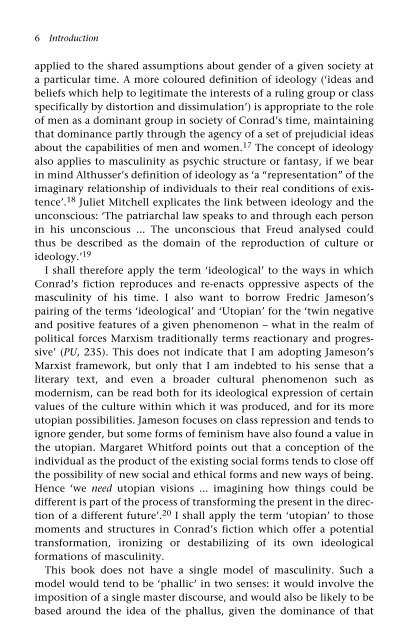Conrad and Masculinity
Conrad and Masculinity
Conrad and Masculinity
You also want an ePaper? Increase the reach of your titles
YUMPU automatically turns print PDFs into web optimized ePapers that Google loves.
6 Introduction<br />
applied to the shared assumptions about gender of a given society at<br />
a particular time. A more coloured definition of ideology (‘ideas <strong>and</strong><br />
beliefs which help to legitimate the interests of a ruling group or class<br />
specifically by distortion <strong>and</strong> dissimulation’) is appropriate to the role<br />
of men as a dominant group in society of <strong>Conrad</strong>’s time, maintaining<br />
that dominance partly through the agency of a set of prejudicial ideas<br />
about the capabilities of men <strong>and</strong> women. 17 The concept of ideology<br />
also applies to masculinity as psychic structure or fantasy, if we bear<br />
in mind Althusser’s definition of ideology as ‘a “representation” of the<br />
imaginary relationship of individuals to their real conditions of existence’.<br />
18 Juliet Mitchell explicates the link between ideology <strong>and</strong> the<br />
unconscious: ‘The patriarchal law speaks to <strong>and</strong> through each person<br />
in his unconscious ... The unconscious that Freud analysed could<br />
thus be described as the domain of the reproduction of culture or<br />
ideology.’ 19<br />
I shall therefore apply the term ‘ideological’ to the ways in which<br />
<strong>Conrad</strong>’s fiction reproduces <strong>and</strong> re-enacts oppressive aspects of the<br />
masculinity of his time. I also want to borrow Fredric Jameson’s<br />
pairing of the terms ‘ideological’ <strong>and</strong> ‘Utopian’ for the ‘twin negative<br />
<strong>and</strong> positive features of a given phenomenon – what in the realm of<br />
political forces Marxism traditionally terms reactionary <strong>and</strong> progressive’<br />
(PU, 235). This does not indicate that I am adopting Jameson’s<br />
Marxist framework, but only that I am indebted to his sense that a<br />
literary text, <strong>and</strong> even a broader cultural phenomenon such as<br />
modernism, can be read both for its ideological expression of certain<br />
values of the culture within which it was produced, <strong>and</strong> for its more<br />
utopian possibilities. Jameson focuses on class repression <strong>and</strong> tends to<br />
ignore gender, but some forms of feminism have also found a value in<br />
the utopian. Margaret Whitford points out that a conception of the<br />
individual as the product of the existing social forms tends to close off<br />
the possibility of new social <strong>and</strong> ethical forms <strong>and</strong> new ways of being.<br />
Hence ‘we need utopian visions ... imagining how things could be<br />
different is part of the process of transforming the present in the direction<br />
of a different future’. 20 I shall apply the term ‘utopian’ to those<br />
moments <strong>and</strong> structures in <strong>Conrad</strong>’s fiction which offer a potential<br />
transformation, ironizing or destabilizing of its own ideological<br />
formations of masculinity.<br />
This book does not have a single model of masculinity. Such a<br />
model would tend to be ‘phallic’ in two senses: it would involve the<br />
imposition of a single master discourse, <strong>and</strong> would also be likely to be<br />
based around the idea of the phallus, given the dominance of that




